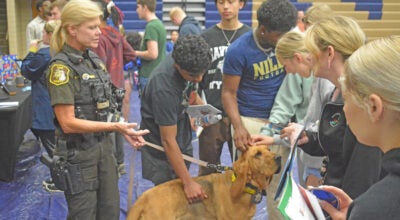BBB: Study shows romance scams often lead to further fraud for victims
Published 9:28 am Friday, February 15, 2019
SOUTHWEST MICHIGAN — With Valentine’s Day comes a surge of activity on dating websites, with singles looking to the internet for a love connection. Unfortunately, these sites are rife with fraudsters who use affection to manipulate their victims out of their money. Worse, a new Better Business Bureau report finds online romance scams often escalate as scammers turn their victims into unwitting accomplices to fraud, known as “money mules.”
In February 2018, BBB issued an in-depth investigative study on romance scams, describing how fraudsters target people who are looking for romance. BBB’s follow-up study released this week, titled “Fall in Love – Go to Jail: A BBB Report on How Romance Fraud Victims Become Money Mules” describes how fraudsters then exploit that relationship further. It digs into the scope of the problem, who is behind it and the need for law enforcement and consumer education to address the issue. Read the complete report here.
As detailed in the original study, romance scammers typically contact their victims through dating websites, apps or social media, often using fake profiles and even stolen credit card information. Using these false identities, scammers may spend months grooming their victims, building what the victim believes to be a loving relationship, before asking for money to handle an emergency or travel expenses.
According to the Federal Trade Commission, romance fraud has biggest losses of any fraud area they track. In 2018, the FTC received 21,000 complaints with losses of $143 million. The number of romance scam complaints to the FTC doubled between 2015 and 2018.
The financial damage inflicted by these scams, which is often accompanied by far greater emotional harm, is often just the tip of the iceberg. According to the new BBB report, 20 to 30 percent of romance scam victims were used as “money mules” in 2018 alone, with these victims numbering in the thousands.
Money mules act as financial middlemen in a variety of scams, laundering money from other victims by receiving money or goods purchased with stolen credit cards and sending them on to the fraudsters, often out of the country, according to BBB. This often happens when the romance scam victim has no money or already has given all of their money to the scammer. The victim may be a willing accomplice or may have a variety of other motives – love, fear, financial compensation for their own losses – but the outcome is the same: By providing this type of aid to the fraudster instead, the victim aids and abets a variety of other frauds, muddying the scope of a fraud and the identity of the real perpetrator.
The scams and crimes in which money mules may become embroiled include business email compromises, fake check scams, credit card reshipping, grandparent scams and even illegal drug transportation. These frauds have in common that the money mules frequently are romance scam victims.
In Kent County, a woman’s online relationship turned her into an unsuspecting money mule, reported the BBB. She agreed to accept packages on behalf of a man she met online and then reshipped them to him overseas. What she did not know is the packages contained high-end laptops and watches purchased in an online scam. The victims of that scam notified the Kent County Sheriff’s Department, which began an investigation into the woman. It was eventually determined that she did not understand what was happening, and the Kent County Prosecutor and FBI both declined to pursue charges.
A 2018 case linked to west Michigan did lead to criminal charges. Sylvia Williams, 80, is facing criminal charges in Florida for her role in a money mule scheme. According to press reports, Williams met a man on a dating website and agreed collect money for him using her bank account. The scam fell apart when a con man from Canada contacted a Grand Traverse cleaning company about a possible contract. The company was sent a check for much more than the agreed price. The business owners were told to cash the check and send the difference to Ms. Williams in Florida. The business owners contacted the police when the check bounced, and Williams was arrested and charged with felony grand theft. She is due back in court in March.
While some prosecutors have pursued these criminal investigations, in most cases, however, there is no desire to take criminal action against unwitting participants who had no financial gain and who stop transferring money for crooks as soon as they realize the role they have been playing.
“The money mule phenomenon adds insult to injury for romance scam victims,” said Phil Catlett, President of the BBB serving western Michigan. “After losing money and dignity to fraudsters they believed were loving romantic partners, these victims find themselves tangled in a web of even more serious crimes, possibly facing consequences themselves.”
According to the new BBB report, cybersecurity experts have traced the bulk of online romance scams to Nigeria, though Nigerian nationals operating these frauds are based in several countries around the world, including the U.S. The same groups involved in romance scams frequently operate other frauds on a worldwide scale. One expert reported that at any given time, there may be more than 25,000 scammers online with victims.
In addition, law enforcement officials said that Jamaican groups that operate sweepstakes and lottery frauds — the subject of an in-depth BBB investigative study in 2018 – have begun running romance frauds as well, using those victims to help launder money from sweepstakes and lottery fraud victims.
The report recommends:
• It is important to warn people about romance frauds before they get invested in an online relationship. Alert them that the loss of their money is not the end of the matter because fraudsters may try to enlist them as money mules. It also is important to exercise caution in one’s own online dating ventures in order to avoid falling for a romance fraud at the outset.
• Romance fraud victims often need counseling to help them overcome the trauma of this fraud. More victim support groups like those in Los Angeles and Ventura, California, would be helpful.
• More warnings to money mules may help alert romance fraud victims that they are engaged in assisting frauds and encourage them to stop.
• More prosecutions of romance fraudsters would help deter romance fraud.
• Banks should continue to alert law enforcement to the use of money mules’ bank accounts.
• Increase cooperation and sharing of information between law enforcement officials in different jurisdictions working on the same cases.
• More training and cooperation is needed internationally to recognize and combat romance fraud.






